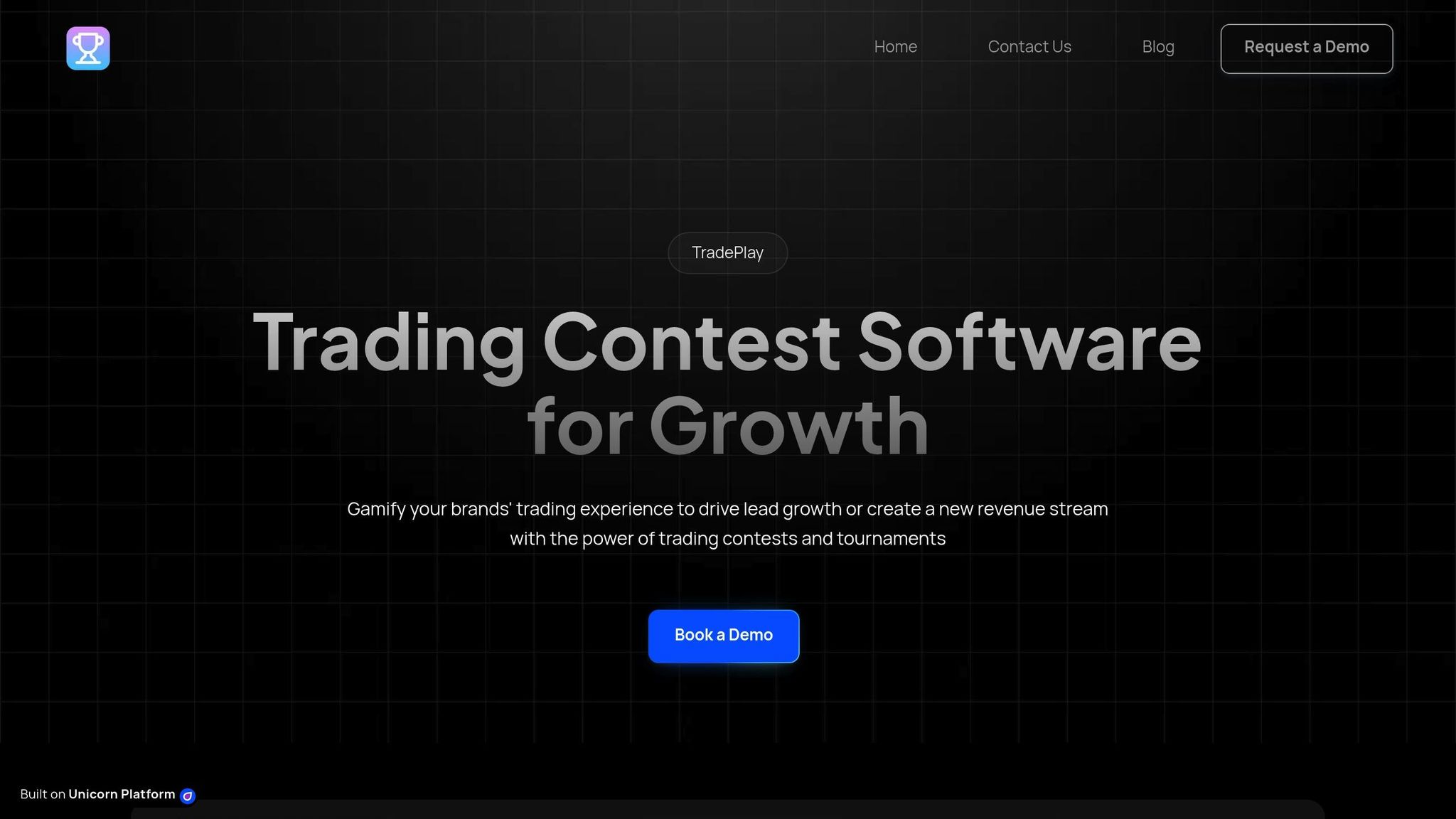Free and paid trading contests each have unique benefits and challenges. Here's a quick breakdown:
- Free Contests: Attract large audiences with no entry fees, but often struggle to convert participants into active traders. They’re great for lead generation and community building but have smaller prize pools and higher dropout rates.
- Paid Contests: Require entry fees, drawing fewer but more serious participants. These contests offer bigger prizes and better engagement, but they’re costlier to run and less accessible to casual users.
Quick Comparison
| Aspect | Free Contests | Paid Contests |
|---|---|---|
| Entry Barrier | No fee, open to everyone | Requires a fee, attracts serious traders |
| Prize Pool | Smaller, often virtual rewards | Larger prizes, including cash |
| Engagement | High initial participation, low completion rates | Fewer participants, higher completion rates |
| Business Goal | Lead generation | Revenue and quality engagement |
Choose free contests for growing your audience and paid contests for generating revenue or finding top trading talent. A hybrid approach can balance both goals effectively.
Free Brokers vs. Paid Brokers for Trading
How to Measure Contest Success
Let’s dive into the key metrics that help evaluate how well your contest is performing.
Attracting and Retaining Users
Free contests often bring in a large number of participants, but turning these sign-ups into active traders can be tricky. On the other hand, paid contests tend to draw fewer participants but often result in stronger engagement.
Here’s what you should measure:
- New user sign-ups during the contest
- Completion rates: How many participants finish the contest
- Conversion rates: How many participants become active traders
- Cost per participant: How much it costs to acquire each user
These metrics provide a foundation for understanding how well your contest drives user acquisition and sets the stage for loyalty.
Measuring User Loyalty
Building loyalty differs between free and paid contests. Free contests thrive on the thrill of competition, while paid contests benefit from participants’ financial commitment, which often translates into higher engagement.
To measure loyalty, focus on:
- Post-contest trading activity
- How often users engage with the platform
- Patterns in account funding
- Participation in future contests
Creative formats like leagues or team-based challenges can also encourage ongoing engagement. The better your retention strategies, the more likely users are to stick around and contribute to your platform’s growth.
Financial Outcomes for Everyone
Understanding the financial impact of your contest is key. Paid contests bring in revenue through entry fees but often come with higher costs for prizes and operations. Free contests are cheaper to run but rely heavily on converting participants into active, paying users.
Key financial metrics to track include:
- Operational and marketing costs
- Prize pool expenses
- Revenue from entry fees (for paid contests)
- Conversion rates of participants to funded accounts
- Long-term customer value from active traders
While paid contests deliver direct revenue, free contests can still be profitable if you focus on volume and effective conversion strategies. By keeping a close eye on these numbers, you can fine-tune your contests to boost engagement, conversions, and overall profitability.
sbb-itb-cad9573
Free vs Paid Contest Analysis
Let's break down the advantages and challenges of running free and paid trading contests, focusing on how they impact growth and engagement.
Free Contests: Pros and Cons
Free trading contests are excellent for drawing in large numbers of participants. With no entry fee, they lower the barrier to entry, making them a great tool for quickly expanding your user base.
| Pros | Cons |
|---|---|
| Attracts high participation | Difficult to convert users into active traders |
| No cost to join | Limited prize offerings |
| Great for lead generation | High dropout rates |
| Builds community | Attracts less serious participants |
| Easy to set up and promote | Lower funded account conversions |
The main drawback? Participant quality. While free contests can bring in a crowd, many participants may lack commitment or interest in becoming long-term traders. Turning these users into serious traders requires a well-thought-out follow-up strategy.
Paid Contests: Pros and Cons
Paid contests, on the other hand, attract a smaller but more dedicated group of participants. The entry fee ensures that only serious traders join, leading to higher engagement and better outcomes.
| Pros | Cons |
|---|---|
| Encourages commitment | Smaller participant pool |
| Offers bigger prize pools | Higher marketing expenses |
| Higher completion rates | More complex to manage |
| Attracts quality participants | Entry fee may deter some users |
| Better conversion rates | Requires strict participant verification |
The financial commitment acts as a natural filter, ensuring participants are motivated and engaged. This results in higher-quality competition and more meaningful trading activity, but it also limits accessibility for casual users.
Picking the Right Contest Type
Choosing between free and paid contests depends on your platform's goals and resources. Here are some considerations to guide your decision:
- Business Stage: If you're in the early stages, free contests can help you gain traction and grow your user base quickly.
- Target Audience: Professional traders are more likely to be drawn to paid contests with attractive prize pools.
- Available Resources: Evaluate your budget for prizes, marketing, and operations to determine what's feasible.
- Long-term Goals: Decide whether your focus is on building a community or generating revenue - or both.
Platforms like TradePlayTech show that a hybrid approach often works best. Free contests can bring in a broad audience, while paid contests can engage serious traders and drive revenue. By using both strategies, you can cater to different segments of your audience and achieve growth and profitability.
Contest Examples in Action
Examples of contests highlight how different strategies can boost engagement and drive platform growth.
TradePlayTech: Balancing Free and Paid Contests

TradePlayTech runs both free and paid trading contests. Their platform supports contests across DXTrade, MT4, MT5, and Tradelocker, offering live leaderboard updates, simple setup tools, and detailed rule options. Free contests attract a wide audience, while paid contests come with integrated payment systems, making them seamless for participants and brokers alike. Up next, let’s look at how prop firms use paid contests to identify top trading talent.
How Prop Firms Use Paid Contests
Prop firms rely on paid contests to assess and develop trading talent. These contests are structured with strict profit and risk benchmarks, requiring traders to meet specific goals over a set timeframe. Only those who consistently show discipline and skill are given the chance to trade using the firm’s capital.
Free contests foster a sense of community, while paid contests serve as a rigorous filter for finding skilled traders.
Conclusion: Making Your Choice
Key Points Summary
Deciding between free and paid trading contests depends on your goals. Free contests are great for attracting a large audience due to their easy accessibility, while paid contests tend to draw serious traders who are ready to invest in their growth. Prop firm contests, on the other hand, focus on strict profit and risk targets to find and develop dedicated traders.
| Contest Type | Ideal For | Main Benefit | Biggest Challenge |
|---|---|---|---|
| Free | Building community, Generating leads | Easy to join | Lower participant engagement |
| Paid | Boosting revenue, Finding top talent | Higher dedication | Fewer participants |
Use this breakdown to guide your decision-making process.
Next Steps Guide
Start by identifying your main goal: are you aiming for community growth, lead generation, or revenue? If building a community is your priority, free contests are a great option. Add value by including educational elements like trading tips or workshops.
For those focused on revenue or recruiting skilled traders, a paid contest is the way to go. Set clear profit goals and risk parameters, and consider offering tiered entry fees to engage a broader range of participants while maintaining quality.
Tailor your contest to your audience. Prop firms often benefit from paid contests that filter for serious traders, while brokers looking to grow their user base might find more success with free contests that emphasize education and community-building.


